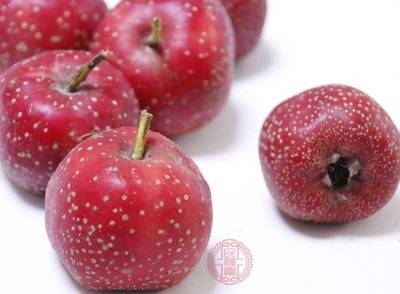People with high blood sugar need to pay attention to controlling sugar in their daily diet, so what should people with high blood sugar pay attention to in their diet? What fruits are good for people with high blood sugar? What are the dietary taboos and precautions for patients with high blood sugar? Let’s take a look together below! Hope it is helpful to everyone!
Hawthorn
Hawthorn is not only a common fruit in our daily life, but also a traditional Chinese medicine in our country’s health-preserving diet, containing rich nutritional substances. The most abundant ones are vitamin C, B, and carotene, which play a significant role in health preservation. Traditional Chinese medicine believes that hawthorn is sour, slightly sweet, and mild in nature. Proper consumption can not only help solve issues like poor appetite but also help quickly lower blood sugar levels.
Additionally, hawthorn can also treat complications of high blood sugar. Patients with high blood sugar may consider eating hawthorn regularly, which is beneficial for recovery.
Lychee
Lychee is a fruit that many people enjoy eating in their daily lives. When the lychees ripen, many can’t wait to indulge. However, it is known that lychee contains a lot of fructose, so many diabetes and high blood sugar patients tend to avoid this fruit. However, experts point out that high blood sugar patients can consume lychee moderately. It is a common subtropical fruit that is not only nutritionally rich but also has high medicinal value, such as lowering blood sugar, improving intelligence, tonifying the spleen, and beauty benefits.
Nevertheless, due to its high fructose content, diabetes patients should consume lychee in moderation, not exceeding three per day. Even for people without health conditions, overeating may lead to an upset stomach.
Apple
Apple is a very common fruit in our lives with many benefits, one of which is controlling blood sugar. High blood sugar patients may consider eating apples frequently.
Banana
The creamy and smooth banana is also a favored fruit for many in daily life, but not everyone is aware of its benefits. Most people only know that bananas promote bowel movements and calm nerves. Recent studies have found that eating bananas appropriately in daily life not only relieves constipation but also has the effect of lowering blood sugar. Modern medical research has shown that bananas are rich in nutrients, particularly proteins, fats, phosphorus, and potassium.
Potassium in bananas is crucial for maintaining the body’s acid-base balance and improving muscle function. Prolonged potassium deficiency can lead to weakness. Moreover, potassium in bananas also aids in lowering blood sugar, so patients with high blood sugar can eat bananas in moderation.
Dietary Taboos for Patients with High Blood Sugar
Taboo 1: Foods rich in carbohydrates
Avoid foods rich in carbohydrates such as white sugar, brown sugar, glucose, and sugar-sweetened treats like candies, pastries, jams, preserved fruits, ice cream, sweetened beverages as well as carbohydrate-rich foods like potatoes, yams, taro, lotus roots, garlic sprouts, carrots, by either reducing their intake or decreasing the amount of staple foods consumed, intake of carbohydrates should be moderate.
Taboo 2: Foods containing saturated fatty acids
It is advisable for high blood sugar patients to avoid foods rich in saturated fatty acids, such as peanuts, as this type of food is not conducive to recovery and may even worsen the condition.
Taboo 3: Egg yolks and animal offal
Egg yolks and animal offal, such as liver, brain, and kidneys, are very high in cholesterol and should be consumed as little as possible or avoided altogether.
Taboo 4: Liquor and alcoholic beverages
Liquor primarily contains alcohol with high calorific value but low nutritional content, hence it is not advisable to consume it.
Six Major Dietary Principles for Patients with High Blood Sugar
Principle 1: Control total caloric intake
Caloric intake should be sufficient to maintain normal body weight or slightly lower than the ideal weight. Generally, daily caloric intake for normal individuals should be around 1500-1800 kcal, while for obese individuals, it should be controlled between 1200-1500 kcal. Consume more low glycemic index (GI below 55) whole grains, vegetables, and fruits.
Principle 2: Eat small meals frequently
Within 2 hours after a meal, blood sugar is usually slightly higher for individuals. For patients with high blood sugar, postprandial sugar levels are a critical risk factor. Eating small meals frequently not only ensures adequate caloric and nutrient supply but also avoids postprandial blood sugar spikes.
Principle 3: Consume appropriate carbohydrates
Carbohydrates refer to sugars in grains, vegetables, dairy, soy products, nuts, and hard fruits. Currently, it is recommended not to overly restrict carbohydrates. Sugars should account for about 60% of total caloric intake, with daily intake controlled between 250g-300g, whereas for obese individuals, it should be between 150g-200g.
Principle 4: Consume high-quality proteins
Eat more soy and soy products, fish, various lean meats, eggs, and dairy products.
Principle 5: Consume adequate dietary fiber
Epidemiological research suggests that dietary fiber can lower fasting blood sugar, postprandial blood sugar, and improve glucose tolerance, so patients with high blood sugar should consume adequate dietary fiber. Foods rich in dietary fiber mainly include whole wheat, buckwheat, oats, corn, as well as vegetables such as spinach, bitter melon, and celery.
Principle 6: Control fat intake
Reduce fat intake, aside from restricting animal fats, daily cooking oil consumption should be kept below 20g. Avoid greasy and high-fat foods, such as fried foods, peanuts, and others. Avoid foods high in cholesterol, such as animal offal, egg yolks, and some seafood.
Conclusion: People with high blood sugar should pay attention to their diets in daily life. What dietary taboos do high blood sugar patients have? I believe everyone has understood the related introductions provided above! Hope this information can help everyone! High blood sugar patients should pay attention to these dietary tips in their daily lives!


